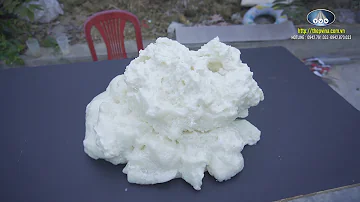What is a polyol used for?
Polyurethanes are used to make flexible foam for mattresses and seating, rigid foam insulation for refrigerators and freezers, elastomeric shoe soles, fibers (e.g. Spandex), coatings, sealants and adhesives. The term "polyol" is also attributed to other molecules containing hydroxyl groups.
What is an example of polyol?
Examples of polyols
Examples of sugar alcohols (a class of polyols) are as follows: sorbitol, maltitol, xylitol, erythritol, isomalt, glycerol, lactitol, mannitol, and hydrogenated starch hydrolysates. Sorbitol, for instance, is one of the most common type of polyol.

What are the benefits of polyols?
Polyols favour saccharolytic anaerobes and aciduric organisms in the colon, purifying the colon of endotoxic, putrefying and pathological organisms, which has clinical relevance. Polyols also contribute towards short-chain organic acid formation for a healthy colonic epithelium.
What is polyol made of?
Polyester polyols for polyurethanes are prepared by the condensation reaction between glycols—such as ethylene glycols, propylene glycols, 1,4 butanediol, or 1,6 hexane diol—and a dicarboxylic acid. Polyesters are a class of polymers that allows for enormous variation of structural and property design.
What is polyol in polymer?
Polyols can be either polyether polyols or polyester polyols. Polyether polyols are made by the reaction of epoxides with compounds having active hydrogen atom. Polyester polyols are made by the polycondensation reaction of multifunctional carboxylic acids and polyhydroxyl compounds.
Is polyol a sugar?
Polyols are a specific group of sugar alcohols that are formed via the catalytic hydrogenation of carbohydrates. They are found naturally in certain fruits, vegetables, and mushrooms; however, they are also commonly used as sugar-free sweeteners in products such as chewing gum, candies, and beverages.
Is polyol A glycerin?
Glycerin (pronounced GLIH–sir–in) is classified as a type of carbohydrate called a sugar alcohol, or polyol.
Are polyols like sugar?
What are polyols? Polyols are sugar-free sweeteners. Polyols are carbohydrates but they are not sugars. They are used cup-for-cup [volume-for-volume] in the same amount as sugar is used, unlike acesulfame potassium, aspartame, saccharin, and sucralose which are used in very small amounts.
Is polyol a resin?
Polyester polyol resin comes from the reaction of diols and dibasic acids. By reducing the amount of catalyst during production, PU becomes easier to customize and also has better physical properties.
Is sugar a polyol?
Polyols are sugar-free sweeteners. Polyols are carbohydrates but they are not sugars. They are used cup-for-cup [volume-for-volume] in the same amount as sugar is used, unlike acesulfame potassium, aspartame, saccharin, and sucralose which are used in very small amounts.
What is the meaning of polyol?
(ˈpɑliˌɔl, -ˌɑl) noun. Chemistry. an alcohol containing three or more hydroxyl groups; a polyhydric alcohol. Also called: polyalcohol.
Are polyols harmful?
A high intake of polyols can irritate the gut. This is because they aren't absorbed well, and attract water to the intestine. This can lead to bloating, stomach pain and diarrhea in both healthy people and those with IBS (6).
Is vegetable oil a polyol?
Vegetable oils are plentiful and contain triglycerides as the key constituent which are nothing but esters of glycerol and fatty acid, making them a very valuable polyol resource.
What are the disadvantages of polyols?
Polyols can induce dose-dependent gastrointestinal symptoms of flatulence, bloating, abdominal discomfort, and laxative effects when consumed in healthy volunteers and patients with IBS.
Are polyols healthier than sugar?
They can be natural or artificially produced. Polyols contain carbohydrates and calories, but they have fewer calories and less of an effect on blood glucose levels than sucrose (sugar).
Is polyol a solid or liquid?
They are typically viscous liquids or waxy solids depending on molecular weight, type of backbone and hydroxyl content.
Is polyols a glycerin?
Glycerin is a type of carbohydrate called a sugar alcohol, or polyol.
Is polyol an oil?
- Natural oil polyols are also called bio polyols; it is derived from vegetable oils. These polyols are produced by transesterification of natural oils such as palm oil, soy oil, sunflower oil, castor oil, peanut oil, canola oil, mustard oil, olive oil, tallow, and lard.
What food is rich in polyol?
Polyols are primarily found in stone fruits and as additives in sugar-free chewing gum, candy, and other low-cal or carb-free foods. They are also found in a number of fruits and vegetables.
Is polyol toxic?
- This substance is classified as not hazardous according to regulation (EC) 1272/2008 [CLP].
Are polyols better than sugar?
Polyols contain carbohydrates and calories, but they have fewer calories and less of an effect on blood glucose levels than sucrose (sugar).
Are polyols bad for you?
Are they safe? Sugar replacers (polyols) have been used in foods around the world for many years. An Expert Committee of the World Health Organization has carefully reviewed them and concluded that they are safe for human consumption!
How many types of polyol are there?
The five most important types of polyols are polyether, polyester, polybutadiene, polycarbonate and polyacrylate polyols. The latter two are used on a much smaller scale because they are more expensive and are typically chosen where superior weathering and/or heat resistance is important.
Are polyols toxic?
Alcohols and polyols vary widely in toxicity. Among the most toxic are methyl and allyl alcohol, which act as nervous system depressants. These materials are organic compounds containing one or more hydroxyl (-OH) groups linked to hydrocarbon groups.
Is polyol flammable?
Polyols are generally combustible. Their generally low volatility means that they are poorly flammable. Flammable and/or toxic gases are generated by the combination of these materials with alkali metals, nitrides, and strong reducing agents.
Is polyol A plastic?
Polyols: versatile, modern, and safe
Polyurethane is a plastic material presented in various forms. It can be made to be rigid or flexible and is a preferred material in a wide range of applications.
